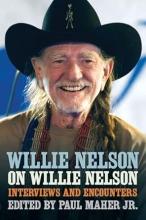Book Reviews

Willie Nelson on Willie Nelson
Paul Maher Jr.
Chicago Review Press
September 16, 2025
ISBN-13: 978-0897333634
Contact: Bianca Maldonado, bmaldonado@ipgbook.com
Reviewed by Edith G. Tolchin (edietolchin.com/book-reviews); EGT@edietolchin.com
Editor, Paul Maher Jr., begins with, “Willie is an American institution.” “Though tasked with writing this introduction for this volume of interviews, I find myself challenged to condense the essence of a man like Willie Nelson into a few pages.”
Having reviewed several books on, and written by, Willie Nelson over the years, this reviewer, and forever Nelson fan, thought it only natural to consider this new book.
Much has been written about Nelson, including many books by Nelson himself, but here is a series of 31 chronological interviews by a variety of writers and journalists, (also including one by Nelson, written in 1974, as a tribute to Bob Wills), each with an intro by Maher.
Nelson’s biological parents married young. Dad, Ira, was sixteen, and mom, Myrle was fifteen. Shortly after Willie was born, they split up, leaving Willie and his older sister, Bobbie, to be raised by their musical grandparents. Willie learned guitar at five and Bobbie played piano.
Working an array of low-paying jobs, Nelson eloped at nineteen with Martha, who was sixteen. Three children, alcohol, and a series of low-paying odd jobs followed, while he built his music career. After a second marriage (to Shirley Collie), and moving to Nashville, Willie signed with RCA in 1964. Claims Maher, Nelson’s music is “a balm for the soul.”
After the editor’s intro, a chronological, biographical collection of interviews follows, dating from 1971. On his way up, Nelson did just about every job that existed during those days, from picker to salesman to radio DJ, gaining a reputation as a rebel, and, later on, an actor.
Once, working with Ray Price, “we did a 90-day tour. . . of one-nighters. . . (and) Holiday Inns.” Then there’s “Trigger,” Willie’s old guitar with the hole in it he’s played for ages, the gold and platinum albums, and the many notable movies he’s made, mostly in the 1970s and 1980s. And there are those infamous Fourth of July picnics, and fund-raising for farmers in need, Farm Aid.
Nelson’s third marriage (to Connie) ended, and he became a dad again, when Lucas Nelson was born in 1988 to (then-) girlfriend Annie.
A captivating interview was done with Holly George-Warren, of Country Guitar, in 1994. A large portion reveals all of Nelson’s guitars and the stories behind them.
Russ Barnard of Country Music magazine had interviewed Nelson many times, but for his 1994 interview, he “just wanted to talk to him.” Barnard’s was “the story of why two grownups from Texas, Willie and me, did what we did today. . . It’s not just the music.”
One of Willie’s sharpest anecdotes is shown during his interview with Cannabist’s Ricardo Baca when asked whether he’d smoke a joint with Donald Trump. “I would. I don’t care.” His appreciation for pot transcends politics.
Nelson’s strength (and goldmine) has been in songwriting, both for himself, and for others. The collection of interviews from a wide variety of publications ranges from 1969 through 2021, providing a spectacular insight into the life of the “outlaw” legend. Said best by interviewer Cliff Radel in 1979, “Willie Nelson sings like he starts interviews. He is as straightforward as they come.”
This book is a collection of interviews by journalists—including a chapter by Willie Nelson himself— dated between 1969 and 2021, often with a bit too many repetitive facts. It’s well-organized by Paul Maher Jr., with ample credit given in the “About the Contributors” section at the end. Maher proves that, aside from being a natural talent, Nelson’s photographic memory is incomparable.
